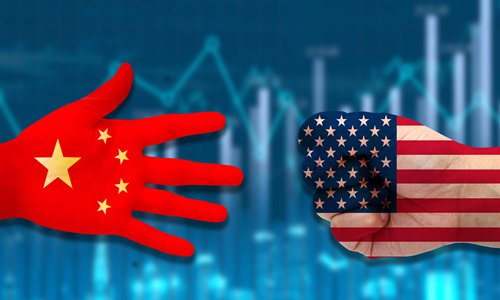HOME >> BUSINESS
Experts slam US ‘currency manipulator’ label
By Wang Yi Source:Global Times Published: 2019/8/14 21:13:40 Last Updated: 2019/8/15 7:50:28
Chinese analysts say criticism can be opportunity for reform

Photo: GT
Chinese financial experts on Wednesday slammed the US labeling China as a "currency manipulator" as groundless slander and behaving like a hegemon.
China should be on guard against more abrupt moves by the US, but it should also take the setbacks as a new opportunity to deepen the reform of the foreign exchange system, they said during a panel discussion themed "Reshaping the International Economic and Financial Structure."
"The US slandered China as a 'currency manipulator.' It's the US' maximum pressure tactic amid the escalating China-US trade war, said Li Yang, chairman of the National Institution for Finance & Development.
The US is attempting to force China to make concessions during the bilateral trade talks in order to gain greater benefits, Li said.
In the face of the US' constant attacks during the trade war, China should not guess what the US is thinking - instead, it should follow the megatrend of the reshaping of the world's governance system and economic and financial structures, according to Li.
The US Treasury designated China as a "currency manipulator" on August 6, citing the Omnibus Trade and Competitiveness Act of 1988. Under that measure, the US Treasury Department should initiate negotiations through the IMF or bilaterally.
But Washington's accusation against China was contradicted by the IMF on August 9. The yuan was broadly stable against the basket, and China's exchange rate was broadly in line with fundamentals, said the yearly review of China's economy by the IMF.
Ding Zhijie, vice president of the University of International Business and Economics in Beijing, warned of further abrupt behavior from the US amid the trade tension, and advised that China should be prepared for a broader financial war.
"[China] should develop a preliminary response plan for a possible financial war. We must have long-term preparations for the complexity of future China-US relations. We must clearly grasp the strategic intentions of the US and be on guard against more abrupt acts by the US," Ding said.
The US on Tuesday delayed the 10 percent tariffs on a series of consumer goods imported from China, including mobile phones, toys and laptops, until December. The move received a positive response in the financial markets.
On Wednesday, the central parity of the yuan against the US dollar was set at 7.0312, up 14 basis points from the previous trading day.
The positive reactions from the financial market and yuan following the US' tariff delay, compared with declines in the financial markets when the US announced new tariff plans on August 1, clearly shows that the yuan's depreciation past the 7 psychological benchmark was just a market response, Ding said.
The US is well aware of the fact that if the tariffs on $300 billion worth of Chinese goods are imposed, there will be a similar market response on the yuan. The US move to label China as "currency manipulator" is setting a trap for China, Ding added.
Hu Zhihao, vice director of the National Institution for Finance & Development, said that the yuan does not have a basis for significant depreciation. China should take the setbacks as a new opportunity for deepening reform of the foreign exchange system.
At present, the yuan exchange rate is generally in a balanced state. Under the overall control of capital project management, China can promptly promote relevant systems establishment and cultivate market entities as soon as possible. The awareness and ability of exchange rate risk management will again transform challenges into deepening foreign exchange reform, Hu said.
Posted in: ECONOMY